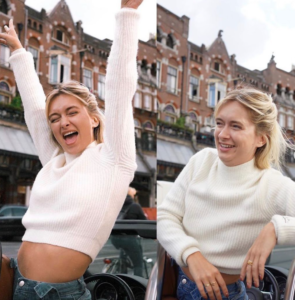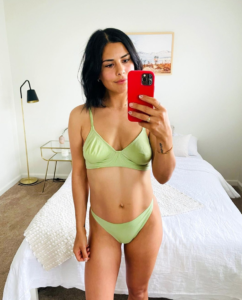Historically, Influencers in the wellness space have gained prominence by promoting a curated vision of health; one that is at best inspirational and at worst, an unattainable fantasy. In other words, it may motivate you to practice yoga or buy avocado toast, but your sun salutations won’t necessarily overlook Runyon Canyon.
Yet, increasingly, a new guard of wellness Influencer is shifting the conversation, publishing content that showcases a more realistic and authentic vision of what it means to be “healthy.” These woman, including Lee Tilghman ( @leefromamerica ), Jeannette Ogden ( @shutthekaleup ) and Chinae Alexander ( @chinaealexander ), often strip away the glowy, oh-so-perfect filter associated with wellness, instead sharing content that speaks to both the positive and negative complexities of wellbeing. Conversant and engaged in issues like body image and mental health, these women are resisting the urge to filter out the uncomfortable and inconvenient truths they encounter on the path to wellness. Instead, they work through such issues in real-time in front of an audience of hundreds of thousands, breaking down the emotional distance between Influencer and follower in the process.
And while that gap still exists – after all, they’re using their platform as means to wield authority on these topics — their thesis often remains consistent: I’m not perfect; I’m like you; I’m figuring it out, too. In doing so, these Influencers not only embody a paradigm shift in wellness, they represent a rising sentiment in popular culture.
Simply look at the upsurge in memes like “Instagram vs. Reality” and the growing traction of #realstagram, an Instagram-native movement celebrating the unfiltered version of oneself. Influencer @rainne.meijer is well known for her rise to fame by showing the reality behind her famous Instagram photos by sharing all the other shots that did not work out as well. Most followers never get to see these shots, only the one picture-perfect moment that took many tries to get right. This helps clarify the distinction between what’s real and what’s not on social media and reminds followers that they don’t have to be “perfect” like their favorite influencers who are not either.


When @shutthekaleup shared a photo of herself in a bikini with the caption “i sometimes feel sexy, even when i can’t fill my cup (.)(.) 😜embracing the norm, the boobies that hang low with no support. the ones that have nursed two healthy boys for 4 1/2 years and still going strong. home is where my bra’s at,” preaching to all mothers that their bodies work hard for them and we should appreciate their natural imperfect beauty, not the unrealistic body ideals some mom influencers portray.

With growing awareness around mental health informing our cultural conversation, acknowledging one’s vulnerability is increasingly seen as a strength versus a weakness. Those seeking to lead conversations online and off should take heed of this important trend: Authenticity isn’t just an act of self-care, it can be a powerful means to inspire.